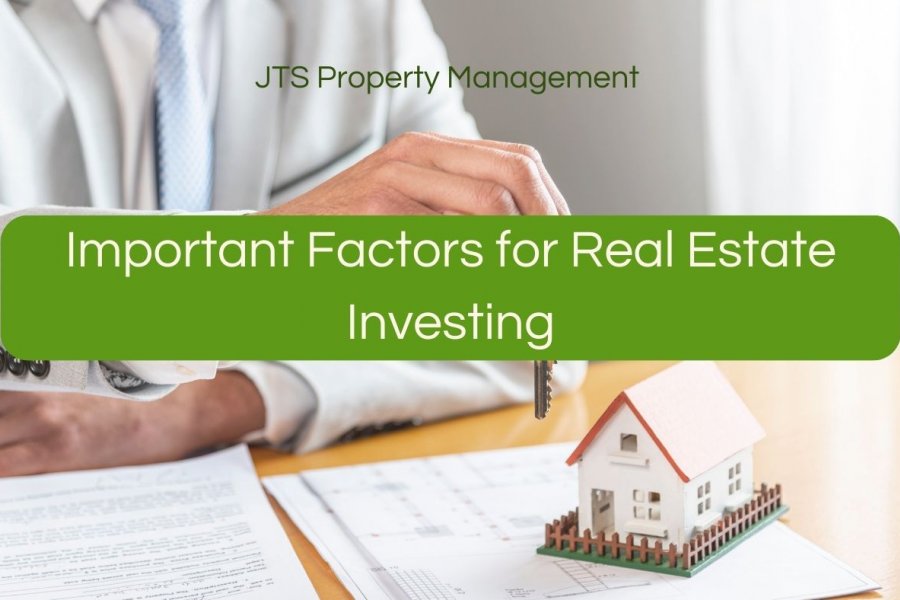Real estate has long been a favorite investment choice for many individuals, including both new and experienced investors alike. The allure of tangible assets, potential for steady income, and the promise of capital appreciation make real estate a compelling investment option.
However, like any investment, success in real estate isn't guaranteed. It requires careful consideration, planning, and execution. As a real estate investor, you also need to devote time and commitment to ensure that your investment will be profitable.
Before you decide whether real estate is right for you, you must first explore the key aspects of real estate investing. They can help you make informed decisions and unlock the full potential of this investment type.
Here are the important factors to consider for real estate investing:
1. Investment Goals
One of the most important things that you need to do before you delve into a real estate investment is to define your investment goals. What are your immediate and future plans for your investment? How do you intend to use your investment property? These are a few things that you need to ask yourself before you decide to venture into real estate.
Here are the most common types of real estate investment strategies that you may consider:
Long-term rentals: One of the most common real estate strategies is to invest in long-term rental properties, where you rent it out to tenants for a year or more. This provides a continuous flow of income stream.

Short-term rentals: Another common investment strategy is to invest in short-term or vacation rentals. You may list your property on home-sharing platforms, allowing you to earn lucrative returns especially during peak seasons.
Buy-and-sell: If you want to generate a profit right away, buying a house and selling it is a great strategy. You can even rent it out while looking for a buyer. There are certain steps for [selling while your property has occupants]().https://www.jtspropertymanagement.com/selling-occupied-properties
Fix-and-flip: Another way to earn generous returns from real estate is to find a fixer upper, get it renovated, then sell it for a profit.
The best strategy depends on your budget, goals, and level of commitment to the investment.
2. Location, Location, Location
Another critical factor in real estate investing is the location of the property. A prime location can significantly impact the property's value and potential for appreciation. A great location can make your property listing stand out from the rest.
Proximity to amenities, schools, transportation hubs, and commercial centers can attract tenants or buyers, making it easier to generate rental income or secure a profitable resale.
3. Market Research
To find the right location, you need to know how to conduct thorough market research. This allows you to understand the local real estate trends and dynamics. Analyze the supply and demand for properties in the area. Is the market experiencing growth or decline?
Being well-informed about the market conditions will help you make decisions aligned with the current trends.
4. Property Condition
When choosing a property to buy, make sure to check its overall condition. The physical condition of the property plays a vital role in its value and income potential.

A well-maintained property can command higher rental rates and attract quality tenants. Consider the age of the property, any required repairs or renovations, and the general upkeep needed to ensure it remains appealing to renters or buyers.
5. Financing and Budgeting
Real estate investments often require significant financial commitments. Determine your budget and explore financing options that suit your financial situation.
It's essential to have a clear understanding of your financial capacity, including not just the property purchase cost, but also the necessary repairs and ongoing expenses like property taxes, maintenance, insurance, and potential vacancy periods.
A good rule of thumb is to not spend beyond what you can charge for. For example, if you’re renovating a rental property, make sure to prioritize repairs that can increase its value and will allow you to increase your rent. Do not spend too much on repairs that are not necessary because they will only add to your cost.
6. Cash Flow Analysis
Cash flow is the lifeblood of any real estate investment. Calculate the potential rental income and deduct all the associated costs to determine the property's net cash flow.
A positive cash flow indicates that the investment is generating more income than expenses, while a negative cash flow might require additional assessment to ensure profitability. Of course, you should aim for a property that generates a high positive cash flow.
7. Risk Assessment
Real estate investing comes with risks, ranging from market volatility to property damage and legal issues. Conduct a comprehensive risk assessment and consider strategies to mitigate potential risks.
This could involve having appropriate insurance coverage, conducting due diligence before purchasing, and staying informed about local laws and regulations.
8. Appreciation Potential
Many investors opt for a rental property. However, while rental income is a key aspect, the potential for property appreciation is also crucial. Research historical price trends in the area to understand how properties have appreciated over time.
Keep in mind, though, that past performance does not guarantee future results, so a balanced approach is recommended.
9. Diversification
Just as with any investment portfolio, diversification is important in real estate. Investing solely in one type of property or one location can expose you to higher risks. Once you start to build your portfolio, consider diversifying your real estate holdings by property type and geographic location to spread risk and enhance your investment's stability.
10. Property Management
If you decide to invest in a rental property, you should consider the benefits of hiring a property management company, espeically if you don't work full-time on your rental. Managing properties on your own can be time-consuming, and there's a lot to learn, especially if you own multiple units.
A property management company can handle tasks like tenant screening, rent collection, maintenance, and addressing tenant concerns, allowing you to focus on other aspects of your investment strategy and building your portfolio.
Bottom Line
In general, real estate investing offers substantial opportunities, but success hinges on careful consideration of these crucial factors. Each of the above-mentioned factors plays a vital role in determining the profitability and sustainability of your investment.
By approaching real estate with a well-informed and strategic mindset, you can navigate the challenges and make informed decisions. It can also help pave the way for a successful and rewarding real estate investment journey.
If you need help in making a decision, don’t hesitate to contact the experts at JTS Property Management and we’ll be more than willing to assist you.



